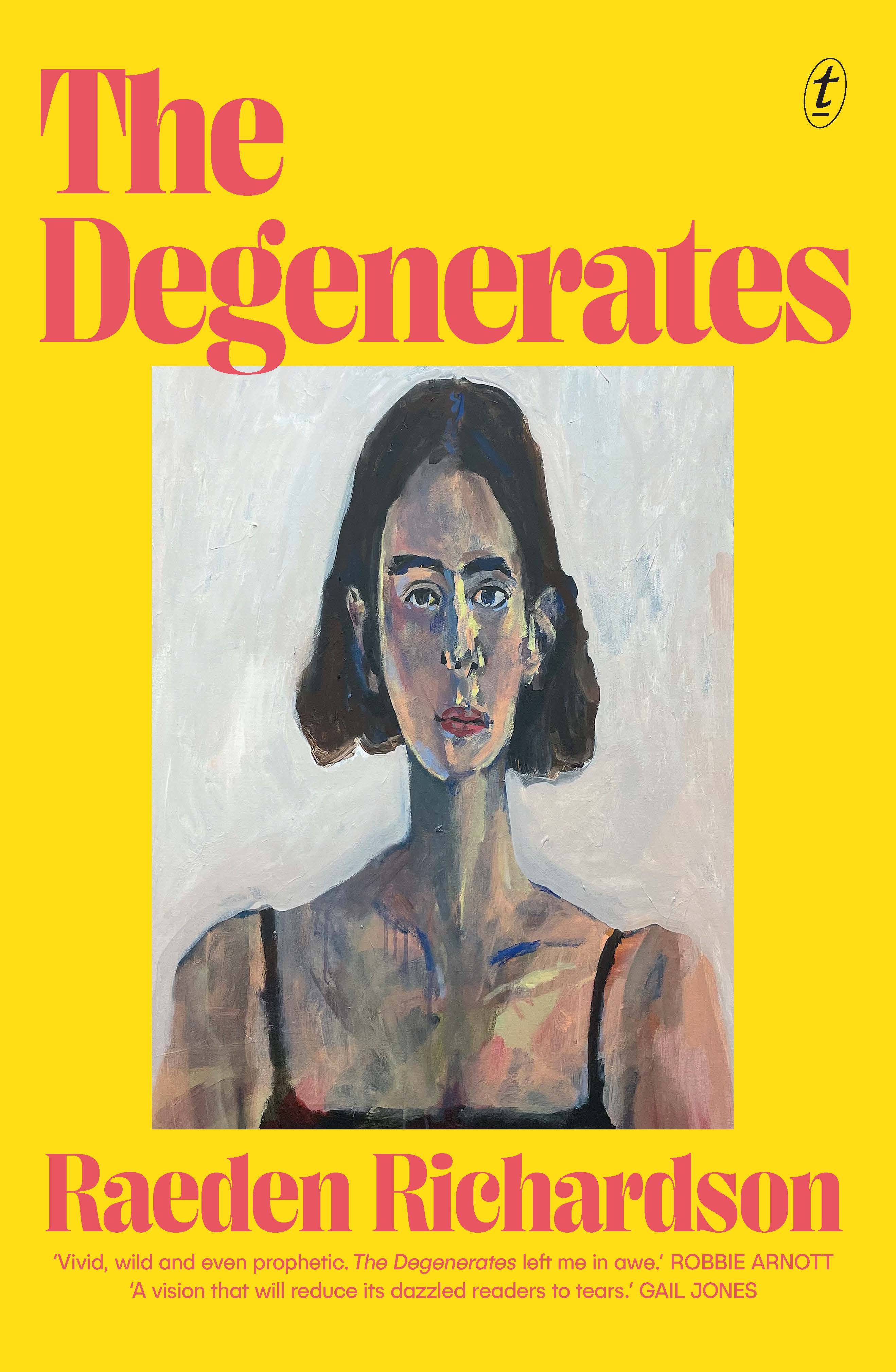
- Free Article: No
- Contents Category: Fiction
- Review Article: Yes
- Article Title: Mother Pulse
- Article Subtitle: A peripatetic first novel
- Online Only: No
- Custom Highlight Text:
Recent decades have seen no shortage of what might broadly be called diasporic Australian novels. Works by Brian Castro and Michelle de Kretser, among others, come to mind. Raeden Richardson adds fruitfully to this tradition with his complex début novel, The Degenerates, which sets out from then-Bombay and journeys to the streets of Melbourne and New York. It is not quite a ‘constellation novel’ (the term coined by Polish novelist Olga Tokarczuk), in which textual fragments and polyphonic voices build a narrative. Richardson nevertheless offers a series of story threads that slowly accumulate and nudge the boundaries of conventional form and storytelling.
- Featured Image (400px * 250px):

- Alt Tag (Featured Image): Anthony Lynch reviews ‘The Degenerates’ by Raeden Richardson
- Book 1 Title: The Degenerates
- Book 1 Biblio: Text Publishing, $34.99 pb, 309 pp
- Book 1 Cover Small (400 x 600):

- Book 1 Cover (800 x 1200):

Broken into sections with one-word titles, and written in a shifting, intimate third-person voice, the novel comprises scenes conveyed in single-paragraph subsections and a racy vernacular. In the opening section, ‘Nasbandi’, meaning vasectomy or sterilisation in Hindi, we meet a young Somnath Sunder Sonpate, an ‘Untouchable’ who has travelled to Bombay to make his fortune.
It is 1976, when Indira Gandhi’s declared ‘Emergency’ has curtailed civil rights and imposed curfews. Somnath ekes out a life on the street fronted by Readymoney Mansion, polishing the shoes of traders and businessmen, repairing the motorcyles of clerks for a single rupee. But Somnath has big ambitions: to amass rupees, build a mansion of his own, and have six sons, then thirty-six grandsons. ‘There was nothing more worthy than an heir, yaah, and nothing more desirable than a hustling, bustling bloodline.’ Meanwhile he befriends Preeti, a street beggar who is tongueless thanks to a ‘beggarwhallah’s’ unbelief in her virgin pregnancy.
Possibly Somnath’s full name is a play on thwarted ambition, but at any rate his plans for sons are cruelly sundered when police arrest him during a curfew and force a vasectomy upon him. Afterwards, he finds Preeti’s abandoned infant on the street. In one of the novel’s magical realist touches, the baby feeds from one of his suddenly lactating nipples. He names the child Maha, for her ‘endless gaze’.
These haunting opening scenes inform all that follows. Quickly we find ourselves in inner Melbourne, where Somnath, Maha at his side, sets up a ‘chop shop’ in Degraves Street, making ‘honest repairs’ to motorbikes and, in time, performing not-so-honest jobs for bikie gangs and passing ‘cash and papers’ to unnamed men.
Years pass, he hires apprentices, Maha grows up, reading widely and munching pastries. But when workaholic Somnath, ‘heart worn out by years of tension’, dies suddenly, Maha’s life pivots. Alone, she begins writing down her father’s story, which metafictionally shapes as the story we have read so far. Though ‘commuter crowds parted at her approach’ (we can only guess at Maha’s physical and mental state), she is blessed with uncanny insight and instantly divines the sad and troubling histories of those she calls ‘the degenerates’ – a term that comes to endow grace rather than contempt. She advertises herself as ‘Mother Pulse … Your Lifelong Listener and Subterranean Storyteller’. Receiving letters from her degenerates, she writes back and becomes known to followers as a ‘deity on Degraves’.
Two stories occupy Maha and form the core of this novel. Titch is a skinny, lonesome boy who finds a soul mate in another outsider, Skeater. Titch and his new friend, who is obese, bond by becoming gym junkies. But when his ally (whom Titch can’t bear to name, and whose name is a literal blank in most of the novel) takes his life, Titch’s life is derailed. He abandons the gym and drops out of university; the ants that overrun his rental, and sometimes Titch himself, are his only companions. Hoping to start a ‘new life’ and ‘delete his months of pain’, he is given a job at a Chadstone bookstore by its young manager, Ginny. Like a baton, the story is passed to Ginny, who bears the scars of familial abuse. Taking a holiday in New York, Ginny finds a new group of friends and plunges into an exciting, if edgy, extended stay. Obliged eventually to come back to dour Melbourne, she pines for and plots a return to New York.
This is a narrative both pacey and immersed in the specifics of everyday life, anchored yet adrift. While the reader must sometimes connect the dots or await a slow reveal, settings and scenes develop by accrual of almost hallucinogenic detail. Events overtake characters with dizzying speed while they mire themselves in minutiae. Richardson locates these characters in particular times and places. We learn what houses, what streets, what shops they occupy. Much takes place in 2017, during Richmond’s AFL premiership season, a non-essential, Melbourne-typical feature. And while Richardson’s attention to world-building is admirable, I didn’t need to know that Ginny’s deodorant is Lynx, her lighter a Bic, and exactly how a strand of her hair winds down a plughole.
For Maha/Mother Pulse and her followers, an area known as the ‘Red Plains’ beyond Melbourne’s fringe comes to signify a final life step, a place of peace and acceptance, or at least of peaceful death. It is also ‘a state of mind’, echoing perhaps the titular remote destinations in Randolph Stow’s To the Islands (1958) and Gerald Murnane’s The Plains (1982). We learn more about Somnath’s aspirations and plans, but I was sorry his moving story was not tracked for longer and more intimately, post-Bombay. The now ageing Mother Pulse endures. Even allowing for the novel’s fabulist orientation, how are we to read this guru figure, whose devoted followers congregate in a kind of refugee camp where everyone is happy?
For this reader, Titch and Ginny develop as the more tangible and affecting characters in a novel that grants dignity to the lost and troubled, and whose vivid stories are conveyed with humour, insight, and empathy.


Comments powered by CComment